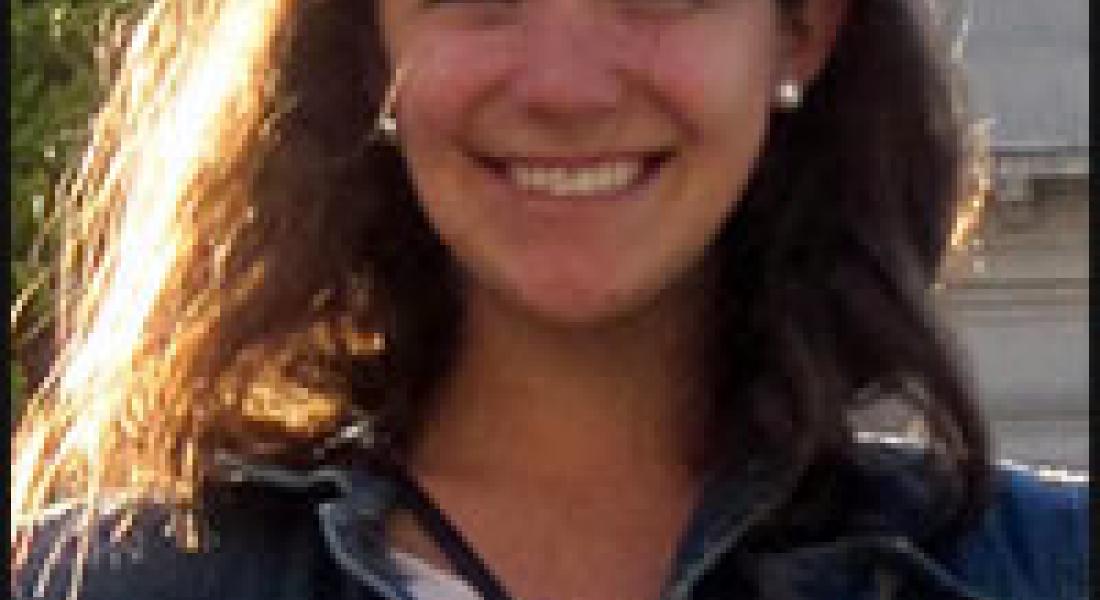From understanding what makes pregnant African women more likely to take beneficial supplements to helping make fresh foods available to communities, two recent graduates of Kellogg student programs are tackling global health issues with support from the Fulbright US Student Program.
With a Fulbright Research Award, International Development Studies (IDS) minor Claire Donovan ’15, a French and Francophone studies major, will work with UNICEF in Togo to examine women’s adherence to micronutrient supplement programs.
International Scholar Christina Gutierrez ’15, a Romance languages and literatures and political science major, will use her Fulbright-Casten Family Foundation Award to pursue a master’s degree at the University of Gastronomic Sciences in Pollenzo, Italy, conduct research on the role of food co-ops in providing people with nutritious, affordable food, and pilot a food co-op.
“These are the kinds of students who contribute to making French and Francophone studies such a vibrant program at Notre Dame,” said Associate Professor Catherine Perry, who taught and mentored both students. “Not only did they demonstrate academic excellence—critical thinking, thoughtfulness, and originality—they also brought back a wealth of cultural knowledge from their studies abroad, which benefited their peers and enriched their classes.
Donovan and Gutierrez said the support they received from faculty members in the Department of Romance Languages and Literatures—including Perry—was essential to their success during internships, independent research, and the Fulbright application process.
“They helped me to see both the beauty and the utility that lie in becoming proficient in a language,” Gutierrez said.
A Concrete Solution
Donovan came to Notre Dame with a passion for global health, gravitating toward maternal health issues as she continued her studies.
At Kellogg, in addition to her IDS minor, she received an Experiencing the World Fellowship to work in an AIDS clinic and evaluate the role of community-based health centers in northern Uganda.
After a semester abroad in Angers, France, Donovan won a Kellogg/Kroc Research Grant and traveled to Senegal to conduct research for her IDS senior capstone project. There, she worked with the Micronutrient Initiative, an international nonprofit. She looked for reasons why some pregnant women were not taking the iron and folic acid supplements offered by local clinics, even though they were readily available and often free.
“This organization offers such a concrete, cost-effective solution for these women,” she said. “The incorporation of these nutrients into your diet—or the absence of them—has such a profound effect on your health.”
Donovan’s work in Togo will build directly on her capstone research. Working with UNICEF, she will create and distribute surveys, interview local women and health care providers, and observe prenatal counseling sessions as she seeks to identify demographic factors that correlate with women’s willingness to follow a supplement program.
After her Fulbright project, Donovan plans to continue to work with international nonprofits and pursue a master’s degree in public health. Her research experiences at Notre Dame, she said, have given her the tools she needs to succeed.
“Two summers and two semesters abroad have shown me that there is a lot you can do to prepare yourself,” she said. “But part of that is knowing that you have to be flexible. So much of the confidence I have just comes from knowing that I’ve had similar experiences and that I am capable of doing this—I’m willing to work hard to make this a project I am proud of.”
A Clear Trajectory
A Hesburgh-Yusko Scholar as well as a Kellogg International Scholar, Gutierrez began working with Faculty Fellow Susan Blum on food issues in her freshman year. She spent summers studying sustainable, natural farming in Costa Rica, working as a research assistant at Yale University’s Rudd Center for Food Policy and Obesity, conducting research at the University of Gastronomic Sciences in Italy, and serving as the food policy research intern at Catholic Charities USA in Washington, DC.
She also received an Undergraduate Research Opportunities Program grant to interview experts in New York and Washington, DC, about the future of food policy in the US and abroad. Her senior thesis focused on interventions designed to reduce sugar consumption in the US.
These experiences, she said, allowed her to delve deeply into the issues she cared about and gave her a much broader perspective on food policy.
“I think I created a very clear trajectory for myself,” she said, “thoughtfully choosing food- and agriculture-related experiences that complemented each other and gave me a more holistic understanding of local and global food systems.”
Through the course of her previous research—and in combination with her volunteer work at the Monroe Park Grocery Co-op in South Bend—Gutierrez concluded that food co-ops are an ideal way to bridge the gap between farmers who grow nutritious crops and people in urban areas who might not have access to them.
As part of her graduate work at the University of Gastronomic Sciences, she looks forward to developing a plan to establish a food co-op in Pollenzo, a northwest Italian town, as a pilot for co-ops in other parts of the world where food resourcing is rapidly changing.
“Italy is a country with such strong and long-lasting regional food traditions,” she said, “but they are slowly becoming less prevalent as people adopt other forms of cuisine—including, unfortunately, more processed and fast foods.”
After completing her master’s in food culture and communications: human ecology and sustainability, she hopes to work for an international nonprofit or think tank in order to influence food and agricultural policies.
“I want to improve public health outcomes by making it easier for people of all income levels to eat nutritious and safe food,” she said.
Originally published at al.nd.edu.







